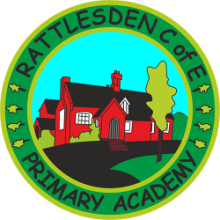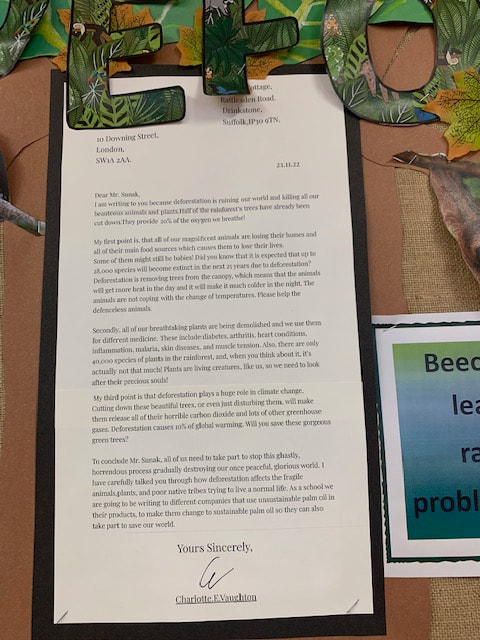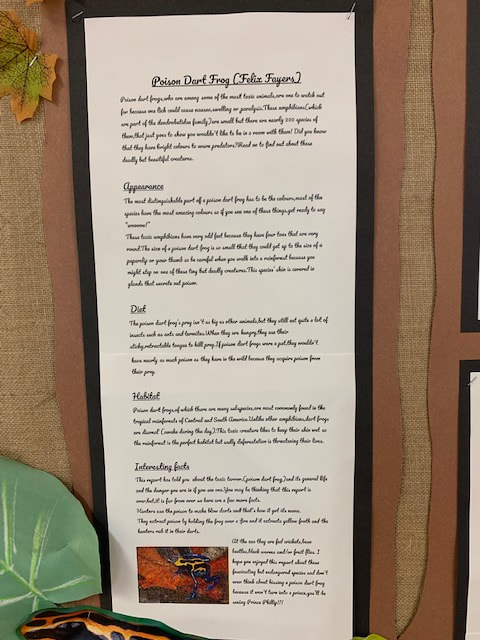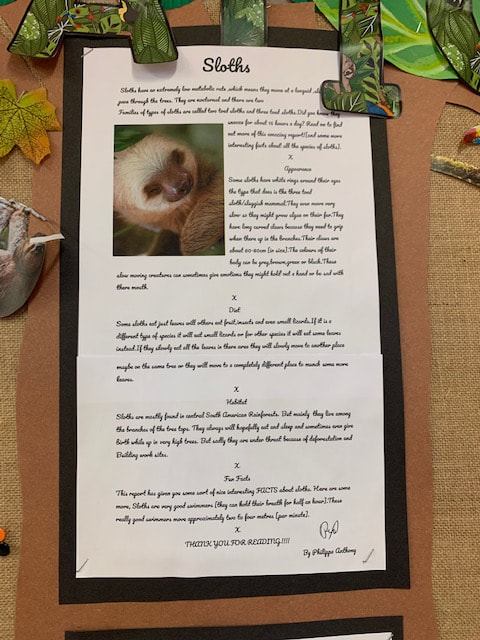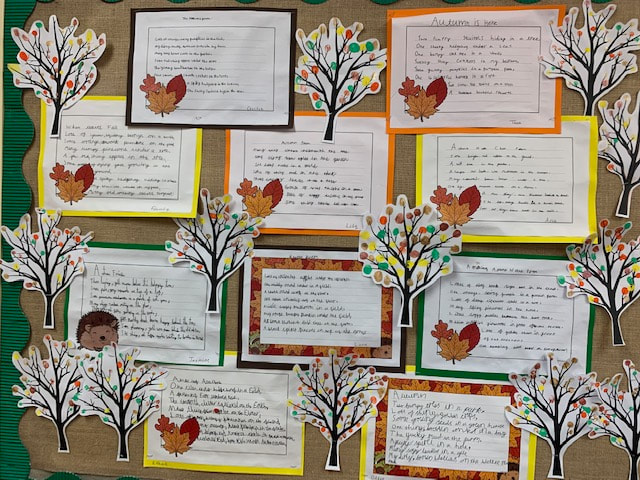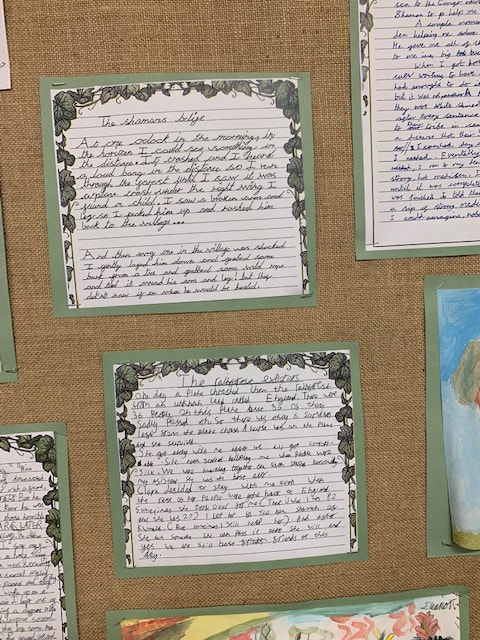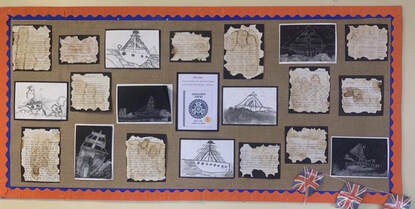Priorities for Writing
- Improve the spelling ability of pupils
- Build stamina and enjoyment
- Raise the number of pupils gaining Greater Depth in writing
Writing
We do all that we can to encourage our children’s natural enthusiasm for writing. We provide a variety of resources to support writing in the early stages. As they grow in confidence and competence, our children are encouraged to express themselves in different forms of writing for example, in descriptive work, reporting skills, poetry, letter writing, instructions, reviews and stories. Their writing extends across the curriculum into History, Geography, Science, Mathematics, Religious Education and Technology. Our expectation is that writing will be of the same high quality in all subjects.
As we encourage our children to become writers, we aim to guide them to improve the quality of their work in terms of spelling, grammar, punctuation and handwriting. We encourage our children to share their work with others, adults and children, valuing all forms of the written word.
As we encourage our children to become writers, we aim to guide them to improve the quality of their work in terms of spelling, grammar, punctuation and handwriting. We encourage our children to share their work with others, adults and children, valuing all forms of the written word.
Spelling
At Rattlesden, we have enhanced our teaching of spelling by introducing Supersonic Spelling Stars. We follow the scheme from year two upwards. This work builds upon the Supersonic Phonic provision in Early Years and Year 1.
Handwriting
Letter-join is the scheme used to teach handwriting. Using the scheme ensures consistency of approach throughout the school and ensures children are practising the same style throughout their time at Rattlesden in order that they leave school with a legible, cursive style of writing which is fluent.
The Letter-join website - features of Letter-join
The Letter-join website - features of Letter-join
Intent, Impact and Implementation
Intent
At Rattlesden School, we strive to help our children develop into articulate and imaginative communicators, who are well-equipped with the basic skills they need to become life-long learners; English learning is key in this. We aim to ensure all of our children develop a genuine love of language and the written word, through a text-based approach; this links closely to the way we teach reading.
Careful links are made across the curriculum to ensure that children’s English learning is relevant and meaningful: where possible linking our reading, writing, and science, and the topic that we are covering in History and Geography. We ensure that children develop an understanding of how widely writing is used in everyday life and, therefore, how important and useful the skills are that they are learning.
Our intentions in writing are for children to:
Implementation
Our whole curriculum is shaped by our school vision which aims to enable all children, regardless of background, ability and additional needs, and to flourish to become the very best version of themselves they can possibly be. We teach the National Curriculum, supported by a clear skills and knowledge progression. This ensures that skills and knowledge are built on year by year and sequenced appropriately to maximise learning for all children.
We aim to develop children’s ability to produce well-structured, detailed writing in which the meaning is made clear and which engages the interest of the audience / reader. Particular attention is paid throughout the school to the formal structures of English: grammatical detail, punctuation and spelling.
Teachers clearly model writing skills and document the learning journey through consistent working walls; guided writing sessions are used to target specific needs of both groups and individuals. Children have opportunities to write at length, in extended, independent writing sessions, applying their taught skills to an unsupported piece of writing.
Throughout the Early Years, Key Stage 1 and Key Stage 2, we often teach writing through a text-based approach, which allows us to meet the needs of the children that we are teaching – through choosing a text that will engage, inspire and motivate. As well as reading a wide variety of genres, children are given frequent opportunities to develop their skills in writing in different genres. Through covering one text per term in depth, children are given the opportunity to put their writing skills into practice through both extended and ‘free’ writing.
Writing is displayed in the hall that shows progression across the year groups based on a chosen subjects. In this way, writing is celebrated by all, as well as knowing they are writing for a purpose and being seen as real writers.
Pupils are taught discrete punctuation and grammar skills, appropriate to their year group, within our textbased approach to planning, allowing opportunities to identify, practice and consolidate grammatical understanding, whilst also being immersed in a text. Children then apply the grammar and punctuation skills that they have learnt in their extended pieces of writing.
Spelling:
At Rattlesden School spelling is taught regularly in focused sessions within each class using Jane Considine’s The Spelling Book scheme.
Learning to recognise the high frequency words on sight is crucial in developing fluency and accuracy in reading and then writing. High frequency words are the words that appear most often in printed materials. Some of the high frequency words are referred to as ‘tricky words’, as the children are unable to use their phonic knowledge to decode every part of the word.
Once children are confident in reading and spelling high frequency words, they are taught spelling rules and are encouraged to apply these rules in their writing. Spellings may also be sent home as part of the children’s homework. In Key Stage 2, once the High Frequency words are embedded, we teach the year groups spelling list. Spelling rules are taught in addition to learning spellings.
Impact
By the time children leave our school they will:
At Rattlesden School, we strive to help our children develop into articulate and imaginative communicators, who are well-equipped with the basic skills they need to become life-long learners; English learning is key in this. We aim to ensure all of our children develop a genuine love of language and the written word, through a text-based approach; this links closely to the way we teach reading.
Careful links are made across the curriculum to ensure that children’s English learning is relevant and meaningful: where possible linking our reading, writing, and science, and the topic that we are covering in History and Geography. We ensure that children develop an understanding of how widely writing is used in everyday life and, therefore, how important and useful the skills are that they are learning.
Our intentions in writing are for children to:
- Write for a purpose
- See themselves as real writers
- Take ownership of their writing
- See writing as an interesting and enjoyable process
- Acquire the ability to organise, plan and edit their written work
Implementation
Our whole curriculum is shaped by our school vision which aims to enable all children, regardless of background, ability and additional needs, and to flourish to become the very best version of themselves they can possibly be. We teach the National Curriculum, supported by a clear skills and knowledge progression. This ensures that skills and knowledge are built on year by year and sequenced appropriately to maximise learning for all children.
We aim to develop children’s ability to produce well-structured, detailed writing in which the meaning is made clear and which engages the interest of the audience / reader. Particular attention is paid throughout the school to the formal structures of English: grammatical detail, punctuation and spelling.
Teachers clearly model writing skills and document the learning journey through consistent working walls; guided writing sessions are used to target specific needs of both groups and individuals. Children have opportunities to write at length, in extended, independent writing sessions, applying their taught skills to an unsupported piece of writing.
Throughout the Early Years, Key Stage 1 and Key Stage 2, we often teach writing through a text-based approach, which allows us to meet the needs of the children that we are teaching – through choosing a text that will engage, inspire and motivate. As well as reading a wide variety of genres, children are given frequent opportunities to develop their skills in writing in different genres. Through covering one text per term in depth, children are given the opportunity to put their writing skills into practice through both extended and ‘free’ writing.
Writing is displayed in the hall that shows progression across the year groups based on a chosen subjects. In this way, writing is celebrated by all, as well as knowing they are writing for a purpose and being seen as real writers.
Pupils are taught discrete punctuation and grammar skills, appropriate to their year group, within our textbased approach to planning, allowing opportunities to identify, practice and consolidate grammatical understanding, whilst also being immersed in a text. Children then apply the grammar and punctuation skills that they have learnt in their extended pieces of writing.
Spelling:
At Rattlesden School spelling is taught regularly in focused sessions within each class using Jane Considine’s The Spelling Book scheme.
Learning to recognise the high frequency words on sight is crucial in developing fluency and accuracy in reading and then writing. High frequency words are the words that appear most often in printed materials. Some of the high frequency words are referred to as ‘tricky words’, as the children are unable to use their phonic knowledge to decode every part of the word.
Once children are confident in reading and spelling high frequency words, they are taught spelling rules and are encouraged to apply these rules in their writing. Spellings may also be sent home as part of the children’s homework. In Key Stage 2, once the High Frequency words are embedded, we teach the year groups spelling list. Spelling rules are taught in addition to learning spellings.
Impact
By the time children leave our school they will:
- Make good progress from their baseline assessment
- Have a love for writing and write for enjoyment
- Be able to produce written work in all areas of the curriculum to a high standard
- Be confident to write for a range of different purposes
Progression of skills - writing
Progression of vocabulary
Progression of skills - Spoken Language
Genre Coverage
A celebration of writing - hall display
Children are also and supported to participate in competitions outside of school time, such as Jeremy won NaNoWriMo Young writers competition after completing a 6000 word novel!
Find Us |
|
Website by lizhawkins.co.uk
